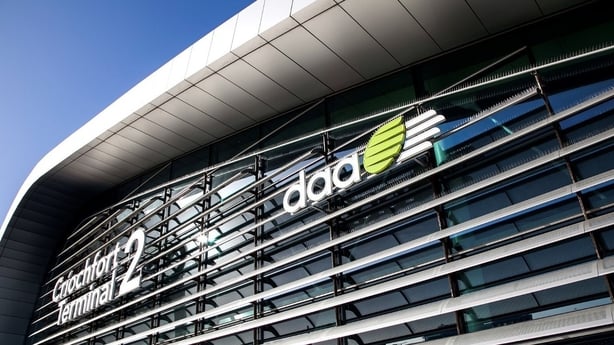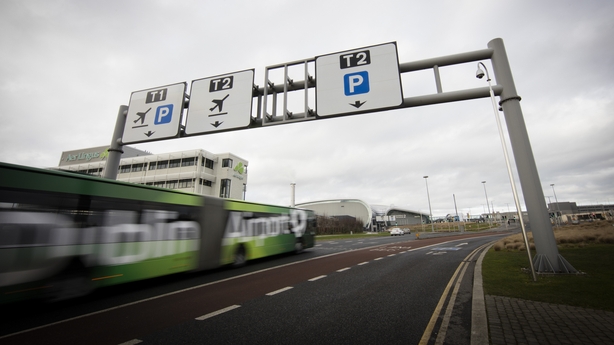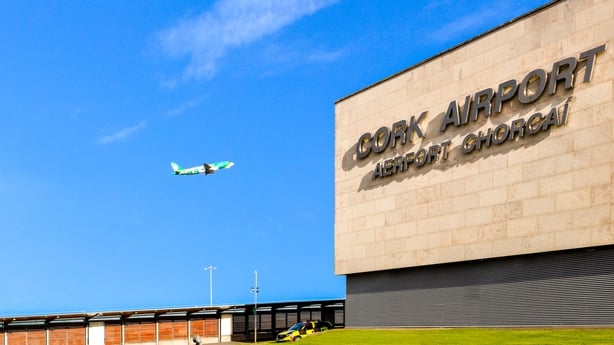Dublin and Cork Airport operator, daa, recorded a profit after tax of €176m last year, up 80% on a year earlier, the company said as it published its annual results for 2023.
Turnover across the 12 months rose 25% to reach €1.018 billion amid the ongoing post-Covid recovery in travel, the first time in its history that daa has breached the €1 billion annual revenue milestone.
The board of the organisation has recommended that a dividend of €31m be paid to its sole shareholder, which is the State - the first time one has been paid since 2019.
A further €153m was also paid in taxes to the State by the daa in 2023, it said.
However, the company also continues to carry €1.6 billion in debt, twice the pre-Covid level, as much of it was accrued during the pandemic.
"In addition to refinancing the existing facilities over the coming years, additional debt funding will be required to support the significant investment in sustainable infrastructure needed to provide passenger capacity at Ireland's two busiest airports in Dublin and Cork," daa's chief financial officer Peter Dunne said.
Dublin Airport is also facing a raft of other challenges, in particular the cap which limits the number of passengers that can use the facilities to 32 million a year.
Last year, 33.52 million passengers either passed through the two terminals, or connected flights, or used other non-terminal facilities.
But daa claims the limit only applies to passengers passing through the terminals, of which there were 31.909 million.
Dublin Airport has lodged a planning application for new infrastructure, which seeks to have the passenger cap increased to 40 million a year.

In the meantime, while a decision is awaited, it has said that further growth at the facility has been severely restricted, with some essential connectivity lost as airlines prioritise hubs outside of Ireland.
"We are a small, open, island economy and stalled growth at our national airport sends a negative signal about investment in Ireland," said Kenny Jacobs, daa's chief executive.
"While we await the outcome of the planning process, daa is making every effort to restrict growth to stay within the cap and continues to work with the IAA as slots regulator and our airline customers with a view to managing capacity at Dublin Airport," he stated.
Kenny Jacobs said the daa is working on the possibility of submitting a second interim infrastructure planning application, that would not involve building anything new and therefore could be decided by the authorities more quickly.
We need your consent to load this rte-player contentWe use rte-player to manage extra content that can set cookies on your device and collect data about your activity. Please review their details and accept them to load the content.Manage Preferences
"So that will be just allowing us to operate to 35-36m without building anything because the airport can take it and because the traffic congestion, which was the reason behind the 2006 condition, no longer exists," he claimed.
He added that 35% of passengers now come to Dublin Airport on the bus compared to 20% in 2019 and 5% in 2006 when the planning application was approved.
But Mr Jacobs said daa can't make a decision on whether to submit that second application until it sees the outcome of the relevant action that is currently with An Bord Pleanala, which is expected at the end of June or July.
In the meantime he said the cap would not have any impact on summer travel at the airport as routes had already been decided.
But he said there will be anxiety among airlines as they look ahead to the winter about what will be possible.
He added that a number of airlines that wanted to set up at the airport have decided not to as they don't want to face into that uncertainty.
The airport operator also claims that it is facing cost pressures and that charges it is allowed to impose on passengers are not high enough.
Yesterday, the Irish Aviation Authority upheld a series of complaint by Ryanair about the nature of discounts to those charges for sustainability measures and told daa to review them before the winter season begins.
"We think the discount scheme is the right thing," he said.
"We'll obviously sit down now with the regulator and the airlines and see what do they want us to change."

But Kenny Jacobs said cost headwinds are a concern given that the regulated charges at Dublin Airport are less than half the average of EU capitals.
Asked whether he could guarantee that the experience for passengers using Dublin Airport this summer would be seamless, Mr Jacobs said he could in relation to the things daa controls.
"We can't control the weather, we can’t control every handler, we can’t control every airline," he said.
"I’ll give you as big a guarantee that anyone running an airport group can give you that we are never more focused on security, on standards and on getting people on their holidays and that is the commitment that we have made."
But Dublin Airport is facing a shortage of car parking space this summer after the competition watchdog refused it permission to purchase the nearby disused former QuickPark car park, which has more than 6,000 spaces.
Daa has said it is in talks with the owner of the property to see if an agreement can be reached to reopen it for the summer period, while an alternative buyer is found.
Mr Jacobs said some progress is being made.
"We have had those conversations and I think in the next two weeks we will know one way or the other whether we are going to be able to operate it over the summer months," he said.

The results also show that 2.8 million passengers passed through Cork Airport last year, the busiest year in its 62-year history, up 25% on a year earlier.
Daa subsidiary ARI, which it its global airport retail business, also achieved significant growth last year.







